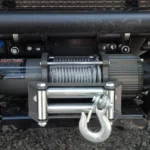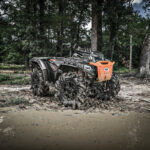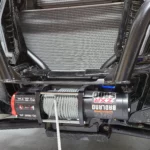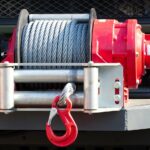When it comes to hauling and lifting heavy loads, both hand winches and electric winches are popular tools. Yet, they each bring a unique set of capabilities and characteristics to the table. The choice between them often depends on the task at hand and specific user requirements. This article will compare hand winches and electric winches in a comprehensive manner, aiming to provide readers with the necessary knowledge to make an informed decision.
Understanding Hand Winches
Hand winches are manually operated devices that are used to pull or lift loads. They function through a ratchet mechanism and a handle which, when turned, reels in a cable or rope, consequently moving the load. Key features of hand winches include their mechanical simplicity, sturdy construction, and general reliability.
Hand winches have wide-ranging applications, from boat trailer operation to forestry, construction, and off-road use. One of the key advantages of hand winches is their independence from a power source, which makes them extremely versatile. However, they do require significant physical effort and are slower than their electric counterparts.
Understanding Electric Winches
Electric winches, on the other hand, are powered by an electric motor. This motor drives a spool that winds up a steel cable or synthetic rope, thereby pulling or lifting the load. Electric winches are often equipped with remote controls, allowing for safe distance operation.
The main applications of electric winches span across numerous fields such as automotive recovery, industrial applications, and marine environments. Electric winches offer the benefit of speed and ease of use, but their reliance on a power source and higher initial cost can be seen as downsides.
Hand Winch vs Electric Winch
| Comparison Aspect | Hand Winch | Electric Winch |
| Power Source | Manual effort required | Needs an electric power source |
| Initial Cost | Generally lower | Higher due to electrical components and motor |
| Operating Speed | Slower due to manual operation | Faster due to motor-powered operation |
| Load Capacity | Variable, but generally lower | Higher, especially in professional-grade models |
| Ease of Use | Requires physical labor, but simple mechanics | Less physical effort required, but more complex operation |
| Maintenance Costs | Lower, due to simpler design | Higher, due to motor and electrical components |
| Dependence on Electricity | None, can be used anywhere | Requires access to a reliable power source |
| Control Precision | High, due to direct manual control | Can vary, but remote controls offer safe distance operation |
| Portability | Highly portable due to lack of power source dependency | Portability can be limited by the need for an electric power source |
| Durability | High, with fewer components that can fail | Can vary, dependent on maintenance and exposure to harsh conditions |
When comparing hand winches and electric winches, it’s essential to understand their distinct characteristics, features, and applications. The following sections delve deeper into several key comparison aspects: performance, ease of use, safety, and cost.
Performance comparison
- Load capacity and weight limitations: Electric winches typically have higher load capacities compared to hand winches, making them ideal for heavy-duty applications. However, specialized hand winches can also handle hefty loads, and their load capacities are continuously improving. Remember that the weight and size of the winch itself can also play a role in transportation and storage.
- Speed and efficiency: An electric winch’s speed and efficiency outshine hand winches due to the power of the electric motor. Electric winches can perform tasks quicker, making them preferable for tasks where time is a crucial factor. Hand winches, while efficient in their own right, operate at a slower pace because they rely on manual power.
Ease of use and convenience comparison
- Physical effort required: Hand winches require a considerable amount of manual effort to operate, which could be physically demanding over long periods. Electric winches, in contrast, require minimal physical effort, as the electric motor does the heavy lifting. If you want to know how to operate this hand winch, do check my article on How to use a hand crank winch?
- Control and operation features: Hand winches allow for a high degree of control over the speed and direction of the load being moved due to their direct manual operation. Electric winches, on the other hand, often come with remote control features that allow for operation from a safe distance, though the degree of control can be less nuanced.
Safety comparison
- Risk of injury: Both types of winches can pose safety risks if not used properly. However, the manual labor involved in using a hand winch can potentially lead to physical strain or injury. Electric winches, while reducing physical effort, can still pose risks if there’s a mechanical failure or if used improperly.
- Maintenance and operational safety: Hand winches are mechanically simpler, making them easier to maintain and less likely to fail unexpectedly. Electric winches, due to their electrical components, require more careful maintenance and are more susceptible to issues like motor burnout or electrical failure if not properly maintained.
Cost comparison
- Initial investment: Generally, hand winches come with a lower initial cost compared to electric winches. The higher price tag on electric winches can be attributed to their complex design and the presence of an electric motor.
- Operational and maintenance costs: Hand winches, with their mechanical simplicity, have lower maintenance costs. Electric winches, on the other hand, might incur higher maintenance costs over time due to their motorized and electrical components. However, the potentially higher efficiency of electric winches may offset these costs in high-volume or professional applications.
Factors to Consider When Choosing Between Hand Winches and Electric Winches
When choosing the right winch for your needs, there are several factors you need to consider. Your decision should take into account not only the specific features of the winches themselves, but also the nature of the task at hand, how often you plan to use the winch, your available budget, and the power sources you have available. Here’s a closer look at each of these elements:
Nature of the Task or Project
The nature of the work you intend to do is one of the most significant factors in choosing between a hand winch and an electric winch.
- Precision: If the task requires precision and delicate handling, a hand winch might be preferable. Its manual operation allows for greater control, which can be vital when dealing with sensitive loads or when working in areas where mistakes can be costly or dangerous.
- Load Size: On the other hand, if you’re dealing with particularly heavy loads or need to move items quickly, an electric winch may be more suitable. These devices typically offer a higher load capacity and faster operation than hand winches.
Frequency of Use and Workload
The frequency with which you intend to use the winch and the volume of work you expect to handle should also influence your choice.
If you expect to use the winch only occasionally or for relatively light-duty tasks, a hand winch might be sufficient. These devices are simple, reliable, and often less expensive than electric winches, making them a good choice for infrequent use or lighter workloads.
However, if you plan to use the winch regularly or for heavy-duty tasks, an electric winch may be a better choice. The convenience and speed of these winches can greatly improve efficiency in regular, high-volume work, making the investment worthwhile.
Budget Constraints
Your available budget is another important consideration.
Hand winches are generally cheaper than electric winches, both in terms of initial cost and ongoing maintenance. If budget is a key constraint, a hand winch could be the most cost-effective choice.
However, it’s worth considering the potential efficiency gains from using an electric winch. While these devices are more expensive, they can often handle larger loads and operate much more quickly than hand winches, which can lead to increased productivity and may justify the higher cost in the long run.
Available Power Sources and Accessibility
Finally, consider your access to power sources.
Hand winches are entirely manual and don’t require any power to operate. This makes them a good choice for remote locations or places where access to power is limited or unreliable.
Electric winches, as the name suggests, need an electric power source. This means they may not be suitable for all locations. However, if you have regular and reliable access to power, the convenience and speed of an electric winch may be a huge advantage.
By taking these factors into account, you can ensure that you choose the winch that best meets your needs, providing you with a reliable and effective tool for your work.
I have written similar article comparing electric winches to other types of winches in the market, do check them out too, I am dropping the links below:
Case Studies and Real-Life Examples
Let me provide you with a couple of real-life experiences I’ve had which will illustrate the effectiveness and suitability of both hand winches and electric winches in different scenarios.
Hand Winch: An Off-Grid Cabin Project
A few years ago, I was involved in a cabin-building project in a remote, off-grid location in the mountains. We were faced with the challenge of lifting and positioning heavy wooden beams for the cabin’s structure. Given the remote location and lack of access to reliable electricity, an electric winch wasn’t an option.
We opted for a heavy-duty hand winch and it turned out to be the perfect solution. With this tool, we could lift the beams easily, albeit at a slower pace compared to an electric winch. But the hand winch gave us complete control over the lifting process, which was essential when positioning these crucial elements of the cabin structure.
Despite the physical effort required, the hand winch was an invaluable tool for this particular project. Its independence from a power source and the precision control it offered made it an ideal choice for the job.
Electric Winch: A Professional Car Recovery Service
In my earlier years, I used to work for a professional car recovery service. In this role, speed and efficiency were of the essence. We were often tasked with recovering vehicles from difficult terrains, or in situations where the vehicle was heavily damaged or stuck.
In this scenario, an electric winch was indispensable. The ability to remotely control the winch allowed us to pull vehicles out of tricky spots while maintaining a safe distance. The high load capacity meant even larger vehicles could be handled without issue. And perhaps most importantly, the speed of the electric winch allowed us to perform recoveries quickly, reducing the time spent on the side of the road and enabling us to help more people in a day.
The upfront cost and ongoing maintenance of the electric winch were certainly higher than a hand winch. However, given the frequency and intensity of use, along with the need for speed and efficiency, the electric winch proved to be a worthwhile investment for the business.
In these two experiences, the choice between a hand winch and an electric winch was dictated by the specific requirements and constraints of each situation. Understanding these nuances can guide you in choosing the most suitable tool for your needs.
Conclusion
In conclusion, both hand winches and electric winches serve vital roles in various applications. The choice between the two should be based on individual needs and circumstances. While hand winches offer mechanical simplicity, independence from power, and cost-effectiveness, electric winches provide speed, ease of use, and high load capacity. It is essential to weigh these aspects carefully before making your final decision.


![Badland vs Rough Country Winch - Pull Capacity, Price, Warranty, Build Quality [Everything Revealed]](https://drwinch.com/wp-content/uploads/2024/03/Badland-vs-Rough-Country-Winch-Pull-Capacity-Price-Warranty-Build-Quality-Everything-Revealed-150x150.jpeg)





